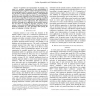Free Online Productivity Tools
i2Speak
i2Symbol
i2OCR
iTex2Img
iWeb2Print
iWeb2Shot
i2Type
iPdf2Split
iPdf2Merge
i2Bopomofo
i2Arabic
i2Style
i2Image
i2PDF
iLatex2Rtf
Sci2ools
124
Voted
IJCNN
2008
IEEE
2008
IEEE
Knowledge representation and acquisition for large-scale semantic memory
Abstract—Acquisition and representation of semantic concepts is a necessary requirement for the understanding of natural languages by cognitive systems. Word games provide an interesting opportunity for semantic knowledge acquisition that may be used to construct semantic memory. A task-dependent architecture of the knowledge base inspired by psycholinguistic theories of human cognition process is introduced. The core of the system is an algorithm for semantic search using a simplified vector representation of concepts. Based on this algorithm a 20 questions game has been implemented. This implementation provides an example of an application of the semantic memory, but also allows for testing the linguistic competence of the system. A web portal with Haptek-based talking head interface facilitates acquisition of a new knowledge while playing the game and engaging in dialogs with users.
Artificial Intelligence | IJCNN 2008 | Semantic | Semantic Knowledge Acquisition | Semantic Memory |
Related Content
| Added | 31 May 2010 |
| Updated | 31 May 2010 |
| Type | Conference |
| Year | 2008 |
| Where | IJCNN |
| Authors | Julian Szymanski, Wlodzislaw Duch |
Comments (0)

